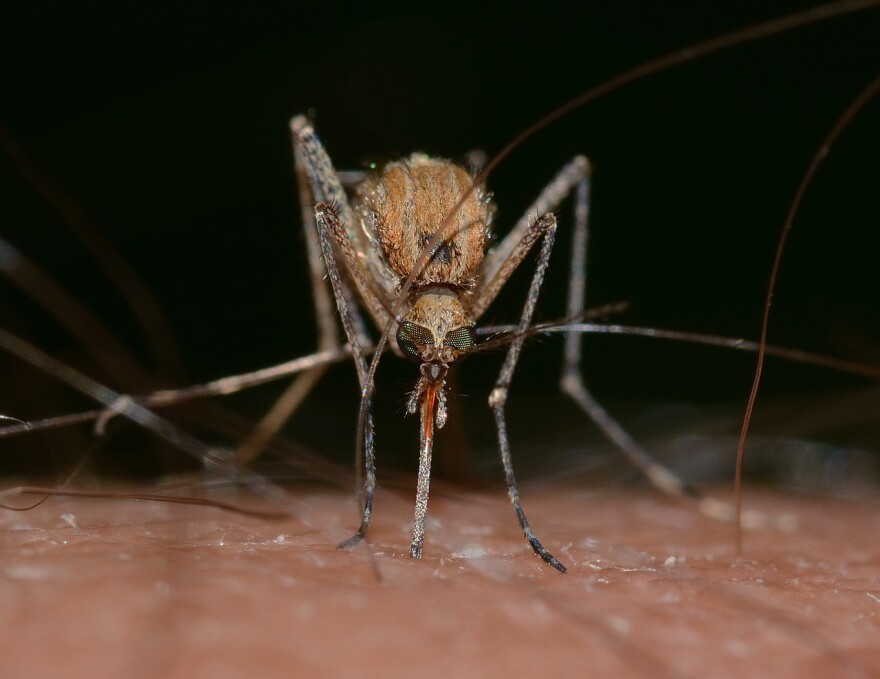The Illinois Department of Public Health has announced the state’s first human West Nile Virus related death of the year.
The victim was an individual in their 90s from suburban Cook County. It’s believed the person had an early onset of West Nile symptoms this month and died soon after.
“We are sad to report the first death of the year from West Nile virus in Illinois,” said IDPH Director Dr. Sameer Vohra. “This death and the 11 additional cases are a stark reminder that West Nile virus poses a serious risk, especially to older people and those with weakened immune systems. While the weather is warm and mosquitoes are breeding, we should all take precautions to ‘Fight the Bite’. Please protect yourself and your loved ones by reducing exposures, repelling insects with clothing and repellants, and reporting locations at high risk for producing mosquitoes.”
Of the 12 human cases, IDPH said seven were reported from Cook County, including two in Chicago. To date, Kane, Macon, Madison, Will and Woodford counties have each reported one human WNV case.
The first WNV-related death in Illinois in 2022 also had an onset of symptoms in early August. There were seven deaths from WNV confirmed in the state in 2022 and an additional 26 non-fatal cases reported (although human cases are underreported).
West Nile virus is transmitted through the bite of a Culex mosquito, commonly called a typical mosquito, which has picked up the virus by feeding on an infected bird. Common symptoms of WNV include fever, nausea, headache and muscle aches. Symptoms may last from a few days to a few weeks.
Four out of five people infected with West Nile virus will not show any symptoms. However, in rare cases, severe illness can occur, including brain infections such as meningitis or encephalitis and paralysis or even death. People older than 50 and immunocompromised individuals are at higher risk for severe illness from West Nile virus.
There is no specific treatment for WNV nor is there a vaccine at present, therefore it is critically important people minimize their risk of acquiring the virus.
IDPH encourages the public to Fight the Bite and take steps to prevent WNV by practicing the three “R’s” – reduce, repel, and report:
REDUCE - make sure doors and windows have tight-fitting screens. Repair or replace screens that have tears or other openings. Try to keep doors and windows shut. Eliminate, or refresh each week, all sources of standing water where mosquitoes can breed, including water in bird baths, ponds, flowerpots, wading pools, old tires, and any other containers.
REPEL - when outdoors, wear shoes and socks, long pants and a light-colored, long-sleeved shirt, and apply an EPA-registered insect repellent that contains DEET, picaridin, oil of lemon eucalyptus, or IR 3535 according to label instructions. The CDC does not recommend use of products containing oil of lemon eucalyptus or para-menthane-diol on children under 3 years old. Consult a physician before using repellents on children under 3.
- REPORT – report locations where you see water sitting stagnant for more than a week such as roadside ditches, flooded yards, and similar locations that may produce mosquitoes. The local health department or city government may be able to add larvicide to the water, which will kill any mosquito larvae.
Last year, 44 counties in Illinois reported positive WNV mosquitoes, birds, humans and/or horses. So far in 2023, there have been 1,817 positive mosquito batches and 13 positive birds from 42 counties. This year, the first mosquito batch to test positive for WNV was reported May 30 in Evanston.
Surveillance for West Nile virus in Illinois involves reporting and investigation of individuals with West Nile virus symptoms and clinical laboratory testing. Environmental surveillance includes laboratory testing on mosquito batches, dead birds, as well as testing sick horses. People who observe a sick or dying bird should contact their local health department, which can determine if the bird will be picked up for testing.
Additional information and data on WNV in Illinois can be found at: West Nile virus.






